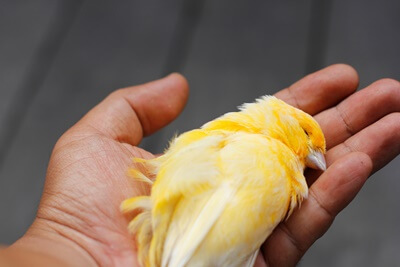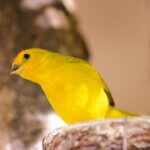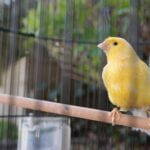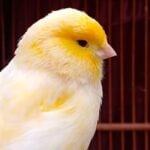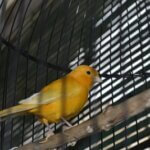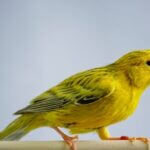Despite being domesticated for hundreds of years, there remain many things in a human environment that can prematurely end the life of a pet canary.
Canaries can die suddenly due to toxic smells, ingesting harmful substances, and health conditions. Certain odors and foods that humans eat can poison canaries.
Canaries can develop illnesses and diseases that lack visible symptoms until it’s too late to do anything.
Be aware of the things that can suddenly kill a canary. Canaries are delicate creatures, so tailor their environment, diet, and activities around their safety.
Do Canaries Die Easily?
Canaries can die overnight or unexpectedly for the following reasons:
Immune System
Only the strongest, healthiest, and most resilient canaries survive in the wild. Their robust genetics are passed down, keeping the entire flock healthy.
Canaries are bred exclusively for their singing ability and beautiful plumage in the pet trade.
Breeders don’t actively consider their health, so captive canaries are likelier to have weaker immune systems. This means that canaries are more vulnerable to life-ending health conditions.
Previous Ownership
If your canary was cared for by previous owners, any neglect might have adversely affected them mentally and physically. The canary may appear healthy, but poor care and abuse take their toll.
Pet Trade Conditions
Canaries are mostly raised domestically by breeders. However, if you adopt a canary transported from afar, you’ll need to take extra care of its welfare.
Pet birds sometimes endure stress due to constant change, noises, and being moved around. Their transport conditions aren’t ideal, and many canaries get sick or are injured.
What Causes Canaries to Die Suddenly?
Canaries die suddenly due to the following:
- Toxic odor inhalation.
- Health conditions without symptoms.
- Extreme temperatures.
- Toxic food consumption.
Sudden death in canaries is always jarring because it can happen overnight without prior warning. Although it may seem like everything is alright, the cause of death can be easy to miss.
Here are the reasons why canaries die suddenly:
Airborne Toxins
Canaries have sensitive and highly efficient respiratory systems. Their air sacs allow air to traverse through their entire body. This system helps them fly, but they’re vulnerable to airborne toxins.
Some of the most common airborne toxins include:
- Scented candles and incense.
- Cleaning products.
- Paint.
- Tefal (non-stick) cookware.
- Perfumes and aftershaves.
- Gas leaks.
- Scented air fresheners.
Death can occur a few hours after inhalation or after a few days of exposure.
Health Conditions
Depending on the condition, canaries can show obvious signs of being unwell. However, they’re also extremely good at hiding their ailments.
There are specific health problems where the symptoms aren’t always obvious, including the following:
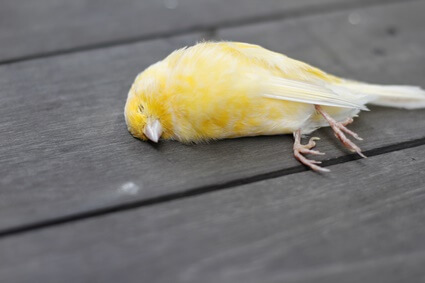
Stress
Long-term stress kills canaries. For example, it’s constantly stalked by a cat. When a canary is stressed, it affects its entire body. After experiencing stress for too long, the body will be overwhelmed.
However, stress can be detected, so you can rectify the situation before things worsen. Unfortunately, stress is often confused with other ailments.
Canarypox Virus
Canarypox virus is an avipox virus that primarily affects songbirds. It can kill canaries in 2-3 days.
Although symptoms can present themselves in canaries with canarypox, the canary dies without warning because the damage is internal.
According to the Journal of the American Veterinary Medical Association, canarypox signs in necropsy include patchy pneumonia and necrotizing bronchitis.
Visible symptoms of canarypox virus include:
- Crusting around the skin.
- Lack of appetite.
- Weight loss.
- Difficulty breathing.
- Fluffed up feathers.
The most common way canaries get infected with canarypox is through mosquitos and mites that pick up the virus from infected birds.
Close contact with infected birds is another way disease spreads, which is why it’s so important to quarantine a new canary.
Egg Binding
When a female canary can’t lay an egg, this is called egg binding or being egg-bound.
Egg binding can occur if the hen is too unhealthy to lay an egg for the following reasons:
- Calcium deficiency.
- Insufficient exercise.
- Malnutrition.
- Hereditary factors.
Hen’s display unusual behavior long before they start laying eggs. Their hormones change as they prepare to mate, nest, and care for their young.
Fear
Canaries can die of fear when they spend lots of time outside or co-exist with another pet in the house. If canaries encounter something they find threatening, they go into shock.
French Molt
A French molt is when canaries have trouble growing out their feathers. It’s caused by polyomavirus and primarily affects young birds less than 25 days old.
This virus affects the way the canaries grow their feathers. They can’t grow feathers, and they eventually lose them if they do.
Blocked Airways
Sometimes, canaries get food and other substances stuck in their airways. They’re unable to breathe and suddenly die of asphyxiation.
Egg Yolk Peritonitis
Egg yolk peritonitis is caused by yolk in the hen’s body cavity.
It occurs when the eggshell is ruptured as the egg is laid. The yolk inflames the peritoneum, which is the thin wall of tissue that lines the canary’s internal organs.
According to the Asian Pacific Journal of Tropical Biomedicine, egg yolk peritonitis causes inflammation and degeneration in the hen’s oviduct, ovary, and intestine.
Old Age
The average lifespan of a pet canary is 10-15 years.
Many breeders and pet stores lie about the age of the canary they’re trying to sell, so many owners raise older birds without even knowing it.
These older canaries reach the end of their lifespan and die suddenly, leaving their owners confused.
Poor Temperature Conditions
The optimal temperature for canaries is 65-80 degrees Fahrenheit. Never put your canary’s cage next to a heater or air conditioning unit, no matter how hot or cold it is inside.
You can make the canary’s environment more comfortable by wrapping the cage in a cover or moving the cage to a cooler location or room.
Toxic Food
Certain foods are toxic to canaries and, if ingested, cause sudden death.
Foods that are toxic to canaries include the following:
- Apple seeds.
- Avocadoes.
- Onions.
- Salt.
- Chocolate.
- Garlic.
Don’t let your canary eat plants, such as lilies, daffodils, and amaryllis.
Do Canaries Die of Loneliness?
Canaries are loners that only come together to mate and raise their young. Occasionally, they’ll forage together, but canaries will be fine if they spend their entire life without encountering another bird.
Canaries can entertain themselves, but they enjoy human companionship.
If your canary seems depressed, it’s most likely due to illness, injury, or bored. Don’t get a second canary to keep the other canary company.
The presence of another canary may stress out your canary, especially if they’re both males.
Signs Your Canary is Dying
Sometimes, the signs pointing to the canary’s death are there. The death seems sudden and inexplicable, but if you think back, there may have been something in the canary’s behavior that indicated a problem.
Here are the signs that a canary is dying:
- Shortness of breath.
- Fluffed feathers.
- Diarrhea.
- Lack of appetite.
- Disinterest in flying.
- Disinterest in singing.
- Weight gain or weight loss.
- Bloating.
- Out-of-season feather loss.
- Lethargy.
- Unusual discharge.
- Lesions around the eyes and feet.
If your canary experiences these symptoms, consult an avian vet without delay.

